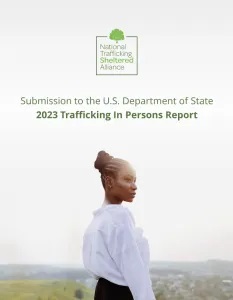PBJ Learning contributes to the National Trafficking Sheltered Alliance’s Submission to the U.S. Department of State for the 2023 Trafficking In Persons Report

Through their survey of 70 organizations across the country, the National Trafficking Sheltered Alliance identified both critical findings regarding the overall state of survivor service provision within America and areas for improvement within the anti-trafficking field.
Submitted February 1, 2023 by the National Trafficking Sheltered Alliance
Compiled by Anna Hagenbuch, Membership Program Manager
Designed by Danielle Ballard, Marketing & Community Engagement Manager
This submission is a compilation of data collected from a survey of 70 active service providers in the field of anti-trafficking across 30 U.S. states. This data seeks to provide relevant responses to questions 16-18 in the Protection Section of the U.S. Department of State's request for information. Additionally a 3 year comparison of relevant data has also been included.
Executive Summary
For the purposes of the 2023 Trafficking in Persons Report, The National Trafficking Sheltered Alliance (NTSA) collaborated with 70 direct service providers for trafficking survivors through a national survey. These 70 providers represent organizations in 30 states who serve survivors of trafficking and exploitation through various services, including residential care and case management. Through NTSA's survey of providers as well as our experience with our national referral system, we were able to better understand the state of service provision for survivors in the U.S., identifying common services provided, various gaps in services, and ways that providers believe the field can be improved.
These organizations represent diversity and commonalities in the anti-trafficking field, serving various demographics through specific program models and specialized services. With 30% (21 out of 70 participants) of the programs having 6-10 staff members and 9% (6 out of 70) having 30+ staff members, it is apparent that anti-trafficking service providers are not uniform in makeup or service scale. Of the participants surveyed, 60% (42 out of 70) were residential programs. Out of those 42 residential programs, 29% (12 out of 42) of the organizations have a current capacity of 4-6 beds for survivors and 26% (11 out of 42) have the capacity of 18+ beds for survivors. These variations in program makeup are significant in highlighting how service providers vary but can each provide different individuals with their desired environment for recovery and healing.
While the anti-trafficking field is relatively new, these programs highlight the history and growth of services for trafficking survivors in the U.S., with the oldest program opening in 1908 and the newest program beginning operations in 2022. With more programs opening over the last decade than ever before, it is evident that this field is growing in exciting and critical ways.
Regarding critical gaps within this field, there are multiple underserved populations. Out of our 70 survey respondents and data from our referral system, we identified a gap in residential care options for specific identities, including: those who are not adult-biological females, those with severe mental health diagnoses, those who experienced labor trafficking, and those on addiction treatment medications.
This data suggests that access to programs and services needs to be improved for survivors of marginalized identities and populations. We believe that access to and quality of services can be improved through greater collaboration between service providers, law enforcement, and the government, with federal agencies offering greater support, financial or otherwise, to those providing direct services to survivors.
Throughout the report, suggestions and recommendations for improvements and advancements within our field are further detailed.
Closing Statement
We at NTSA recognize the importance and value of The State Department's annual Trafficking in Persons Report and are so grateful for the invitation to submit findings from within our national network. As a community of residential programs in the United States, our mission is to continue to uplift and amplify the voices and services of direct providers across the country. These organizations are providing essential on-the-ground care for survivors and, in doing so, have valuable insights and knowledge about the state of trafficking and service provision within our country. We thank all of the organizations that participated in our survey, and we thank every worker, volunteer, and survivor leader on the front lines providing essential support and services to survivors of trafficking and exploitation. We hope that our submission will help inform how the anti-trafficking field in the United States has grown in the past year and can continue to improve in the future.
Thank you!
Melissa Yao, Executive Director
National Trafficking Sheltered Alliance
Participating Organizations
3Strands Global Foundation, A 2nd Cup, A Safe Place, Alabaster Jar Project, Amirah, AnnieCannons, Bloom for Women, Catch the Wave of Hope, Center for Justice & Reconciliation, Chains Interrupted, CherishedLA, Created Gainesville, Dahlia's Hope, Dawn's Place, Elijah Rising, EMMAUS, End Slavery Tennessee, Engedi Refuge, Freedom and Restoration for Everyone Enslaved, GenerateHope, Glory House, GloryB, Gracehaven, Haven Homes of Detroit, Her Song, Ho'ola Na Pua, Hookers For Jesus, Hope Ranch For Women, HRC Ministries, Jubilee Havens, Justice House of Hope, Kherut, Latisha's House Foundation, Love's Arm, Meet Me at the Well, Metanoia Manor, MiCreate, Mirror Ministries, Naomi's House, PBJ Learning, PeaceWorks, Pillars of Hope, Rebecca Bender Initiative Elevate Academy, Redeemed Ministries, Refuge for Women, Refuge of Light, REHOPE (DBA Restoration House of Greater KC), Rejuvenating Women, Rescue Her, Rest Stop Ministries, Restore Corps, Restoring Ivy Collective, Scarlet Hope, Selah Freedom, Southern Grit Advocacy, StreetlightUSA, Sycamore Farm KY, The Hope Project, The Key2Free, The Net, The Salvation Army, The WellHouse, Thistle Farms, Trafficking Law Center, Unbound Now Houston, United Way of Pasco County, WillowBend Farms, Wings of Refuge, Worthwhile Wear, Zoe Ministries of Delaware.
